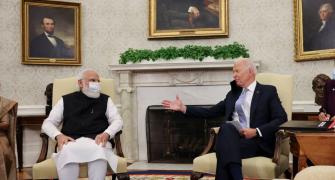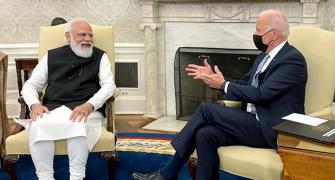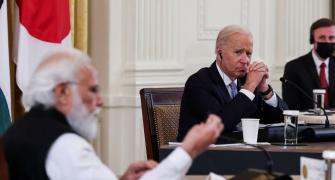Prime Minister Narendra Modi said on Saturday that countries with 'regressive thinking' that are using terrorism as a 'political tool' must understand that it is an 'equally big threat' for them also, in a veiled attack on Pakistan which is accused by its neighbours of providing safe havens to terrorists.

Addressing the 76th United Nations General Assembly session in New York, Prime Minister Modi also called for ensuring that no country 'tries to take advantage of the delicate situation in Afghanistan and use it for its own selfish interests'.
'Today, the world is facing an increased threat of regressive thinking and extremism. In such a situation, the entire world must make science-based, rational and progressive thinking the basis for development.
'In order to strengthen a science-based approach, India is promoting experience-based learning,' he told the UNGA meeting.
'On the other hand, countries with regressive thinking that are using terrorism as a political tool must understand that terrorism is an equally big threat for them,' Modi said in an apparent reference to Pakistan.
Pakistan's neighbours, including Afghanistan's previous government and India, and the United States have long accused Islamabad of providing safe haven and support to militants.
Modi said it is absolutely essential to ensure that Afghanistan territory is not used to spread, terrorism, and for terrorist attacks.
'We also need to ensure that no country tries to take advantage of the delicate situation in Afghanistan and use it for its own selfish interests,' he said.
Pakistan, specially its intelligence agencies, has close ties with the Afghan Taliban, including its dreaded faction the Haqqani Network, which has seized control of Kabul last month.
The Haqqani Network, believed to be behind a number of kidnappings and attacks against US interests in Afghanistan, was accused of bombing the Indian mission in Kabul in 2008 in one of the deadliest attacks in the Afghan capital that killed 58 people.
Four top leaders of the Haqqani Network are holding key positions in the interim Taliban government which includes at least 14 Cabinet members blacklisted by the UN.
Under India's Presidency last month, the UN Security Council adopted a strong resolution reiterating 'the importance of combating terrorism in Afghanistan, including those individuals and entities designated pursuant to resolution 1267 (1999), and notes the Taliban's relevant commitments'.
At the time, Foreign Secretary Harsh Vardhan Shringla had said that the resolution 'underlines terrorist individuals and entities designated by UN Security Council (resolution) 1267. This is of direct importance to India'.
'Needless to say the adoption of the resolution is a strong signal from the Security Council and the international community on its expectations in respect of Afghanistan,' he had said.

In his speech, Prime Minister Modi said that the world must fulfil its duty by providing help to the people in war-torn Afghanistan where women, children and minorities are in need.
'At this time, the people of Afghanistan, the women and children of Afghanistan, and the minorities of Afghanistan need help. And we must fulfill our duty by providing them with this help,' Modi said.
Last month, India had warned that a 'grave' humanitarian crisis is unfolding in the war-torn country and everyone is concerned about the increasing violations of fundamental rights of the Afghan people.
Tributes to the victims of COVID-19
The PM noted that for the past one-and-a-half years, the world is facing 'the worst pandemic of the past 100 years'.
He paid his tributes to all those who lost their lives due to COVID-19 and expressed his condolences to their families.
'For the last-one-and-half years, the world has been grappling with the worst pandemic it has seen in a hundred years. I pay my tributes to all those who have lost their lives in a dangerous pandemic and I express condolences to their families,' Modi said.
India is 'mother of democracy'
Addressing the UNGA, Modi said that India is known as 'the mother of democracy', adding that 'our diversity is the identity of our strong democracy'.
'I represent the country, which is known as the mother of democracy. India enters 75 years of its independence this year. Our diversity is the identity of our strong democracy,' he said.
'In a country that has dozens of languages, hundreds of dialects, different lifestyles and cuisines. This is the best example of vibrant democracy,' he added.
'Little boy who helped his father at tea stall is addressing UNGA for fourth time'
Highlighting the strength of the Indian democracy, Modi noted how a little boy who at one time used to help his father at his tea stall, is today addressing the UNGA for the fourth time.
'The strength of the democracy is demonstrated by the fact that a little boy who at one time used to help his father at his tea stall is today addressing the UNGA for the fourth time,' Modi said.
The theme for this year's General Debate is 'Building Resilience through hope to recover from COVID-19, rebuild sustainably, respond to the needs of the planet, respect the rights of people, and revitalise the United Nations'.
Modi arrived in New York on Friday evening for the final leg of his three-day visit to the United States.
He left from Washington, DC on Friday after a bilateral meeting with President Joe Biden and attending the Quad Summit.
The prime minister also held bilateral meetings with Vice President Kamala Harris, and his Australian and Japanese counterparts -- Scott Morrison and Yoshihide Suga respectively -- in in Washington, DC.
Modi also participated in the first in-person Quad Summit and held meetings with five global CEOs for potential investments in India.
-- with inputs from ANI








